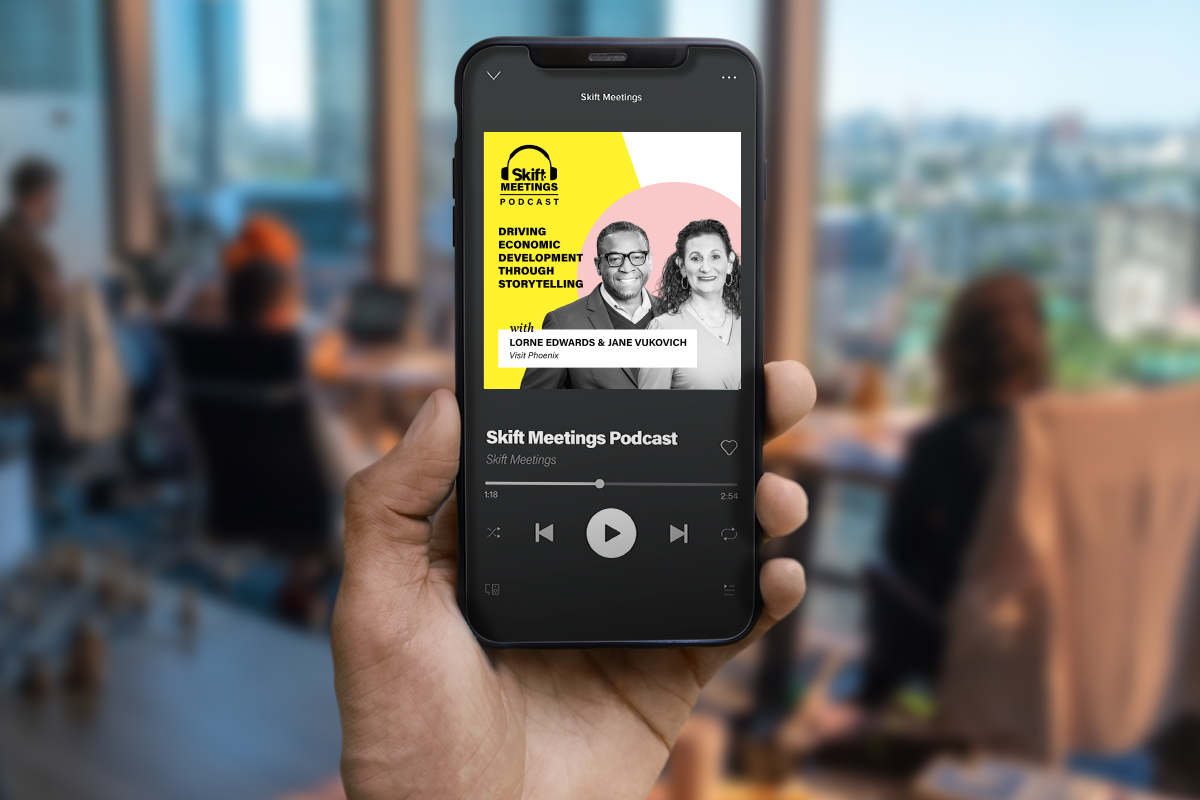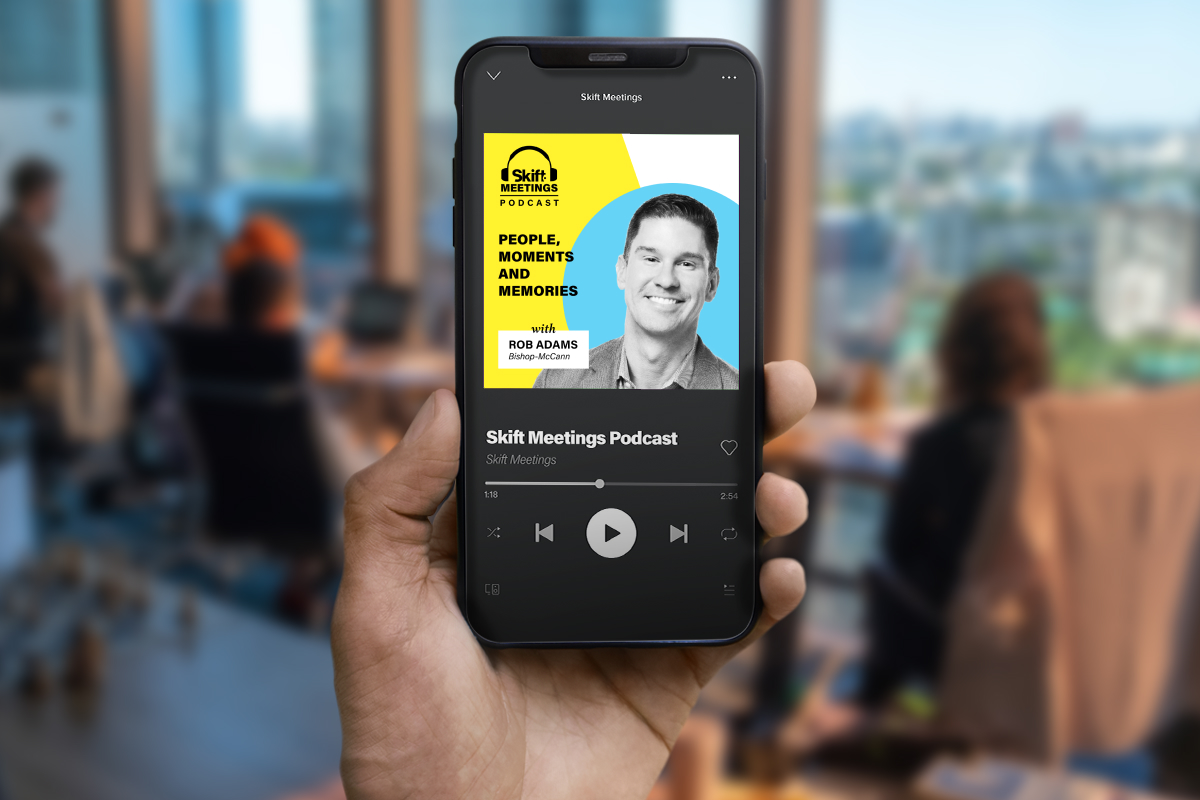In this episode of the Event Manager Podcast by Skift Meetings, we are joined by Amy Calvert, CEO of the Events Industry Council (EIC) to discuss advocating for the event industry in the wider business community.
Like many event professionals, Calvert didn’t set out to join this industry, instead studying English Literature and Fine Arts at university. She began working in the industry as an intern, with the original aim of opening her own catering business. This has since developed into a 30-year career within the event’s industry, with her first career experiences being within the hotel and destination management space. Calvert has been CEO of EIC since 2019.
Subscribe to the Skift Meetings Podcast: Apple Podcasts | Spotify | Overcast | Pocket Casts | Google Podcasts | Amazon | RSS
EIC is a global federation which serves the business events industry, with 34 member associations and they represent all sectors and global regions of the industry, in turn serving over 200,000 individuals. They have core pillars, such as advocacy, research, professional standards and professional recognition. Through sharing resources they can help individuals through their industry journey in a variety of different ways, some of which Amy details. They also provide the Certified Meeting Professional (CMP) credential, of which there are 12,000 recognised individuals globally, with Amy adding that they are currently working on advancing this qualification. In its simplest terms, Amy sees EIC as a community of event industry organizations that have come together to serve those that work in the industry through the work they do together.
In taking over the role at EIC, Amy felt it was important to not only have a strategic plan for the organization, but to get to the heart of EIC’s purpose. From these discussions, and knowing that they represent various perspectives and areas of the events industry, they knew they had to ensure that the work they do remains impactful within the community. This led to them noting their unique position to address the pan-industry issues, such as building capabilities, supporting the workforce, sustainability, equity and inclusion and so much more, which are global challenges that cannot be solved or addressed individually. It was agreed that EIC’s role was to help advance these issues on behalf of the people and organizations that they serve, via a variety of avenues and approaches. This has become the framework that they have engaged in over the past three years. Amy delves into this a little deeper, also noting that EIC’s role is to assess the current environment to help aggregate the available resources, whilst ensuring that they do recreate areas that already exist.
Amy notes that EIC is an ‘agnostic’ organization, and as such they have the ability to bring together those within the events industry, be it EIC members or non-members, to have elevated discussions around the state of the events industry. This unique opportunity was very evident during COVID, where they reached out beyond their main network to enable conversations around adapting and innovating to help everyone move forward in this new world. She also notes the lasting impact of APEX (Accepted Practices Exchange Commission), an initiative born via this approach during COVID.
The events industry doesn’t operate within its own bubble, but is a component of almost all business sectors; they either have an events department or they attend/host their own meetings, events and conferences as they relate to their business. However, the work and importance of events professionals within the wider business community is often overlooked or not fully understood. With this in mind, Amy notes that EIC looks at the direct and indirect impact of events globally via their Economic Impact Study, and that they are looking out with the industry to engage with those that have the power to influence policy which can impact the events industry workforce and industry. Amy believes that the impact of events on people and communities should be at the heart of these discussions, helping to humanize the work that takes place. Calvert notes that EIC wants to look at the indirect impact of events, for example how events can help build other sectors such as investment in infrastructure, research, collaboration with universities and so much more. This is a project that is long term as these impacts are often not realized immediately but over a period of time.
Calvert adds that EIC has not traditionally been engaged in policy work, however, the advocacy projects they have been involved with has become foundational to the work of other organizations and groups that are operating within the policy space. Amy notes that advocacy involves a multi-layer approach, each of which requiring different key components. Calvert, and EIC, believe that everyone has a role to play in advocacy work within the industry. At the heart of what we do are people and Amy argues that we should focus on the people and the human connection that we foster, noting that people are at the core of organizations, regardless of the sector you work in and as such should be at the forefront of discussions and decision making. Calvert also discusses some of the resources that EIC have available, which event professionals can use as part of their toolkit to advocate for the events industry, helping everyone be part of the conversation and amplification of the event industry’s impact and wider role within the global business sector.
Calvert dives a little deeper into two of these resources, one of which focuses on sustainability and is the result of a global collaboration. The other focuses on diversity and inclusion via their Equity and Inclusion plan which was developed after the murder of George Floyd. EIC had been having conversations around the issues of systemic racism, equity and accessibility within the events industry, leading to a task force being created to look at this area. They began by looking at where we are right now, collating information and tools that are currently available, and how to move forward. EIC has created a framework which will allow them to measure the impact of their work over time, providing them with the ability to understand if this has moved the conversation forward and created change. Ultimately, Calvert believes that the way to help create positive change is by having meaningful conversations with partners at various levels.
As always, this is just a look at some of the key topics covered in this episode’s discussion but there is so much more to hear, so why not dive in and enjoy this in-depth chat.
Whilst you’re at it, hit the subscribe button on your favorite podcast app to ensure you never miss an episode.





